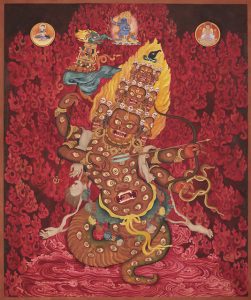
It’s time for a pop quiz. I know—nobody told you there’d be a quiz, but today there is a quiz.
When you think of suffering, how would you describe it?:
A. Mental
B. Physical
C. Emotional
D. Spiritual
E. All of the above
If you chose “E,” All of the above, or if you refused to answer my question, or if you answered with any of the options, you are correct!
How can that be true?
Suffering comes in many forms, and it’s different for each of us, based on our own experiences. Suffering is not only physical pain or emotional distress; it’s a combination of mental, physical, emotional, and spiritual turmoil that can shake you to your core.
You can think of suffering as a thread that you cannot simply cut or avoid. It weaves its way through your existence, touching you in various ways and at unexpected moments. Instead of resisting or running from suffering, you would be wise to embrace it as an inevitable aspect of your human experience. This thread or experience of suffering is not uniquely yours; we will all encounter suffering in one form or another. This shared experience of suffering unites us as human beings, fostering empathy, understanding, and connection. By acknowledging the universality of suffering, you can find solace in the knowledge that you are not alone in your struggles. In your lifetime you may face suffering in multiple forms.
Physical pain might be one of the most obvious causes of suffering. A throbbing headache, sore muscles, or a chronic illness that reminds you of your mortality.
Emotional suffering delves into the depths of your inner being, stirring up feelings of grief, sadness, anxiety, and despair. It’s the heartbreak that shatters your sense of self, the betrayal that leaves you questioning your trust in others, or the loneliness that leads you to feel isolated and alone. Emotional suffering cuts to the core of your humanity, revealing vulnerabilities that you may have long kept hidden.
Spiritual suffering takes you on a journey beyond the physical and emotional realms, challenging your beliefs, your values, and your sense of purpose in the world. It’s the existential crisis that leaves you questioning the meaning of life, the loss of connection to something greater than yourself, a sense of emptiness that no material possession can fill. Spiritual suffering calls for deep introspection and a reevaluation of your place in the grand scheme of things.
Each form of suffering serves as a mirror that reflects your deepest fears, desires, and insecurities. Whether it’s physical pain that tests your resilience, emotional turmoil that uncovers your vulnerabilities, or spiritual distress that challenges your beliefs, suffering presents you with an opportunity for growth and self-discovery. The good news is that your suffering is one of your wise teachers.
Physical pain, in all its relentless intensity, has the power to shape and mold you in ways you never thought possible. Once you have experienced extreme pain, you will view other discomforts differently. For example, a friend of mine, having gone through radiation therapy and chemotherapy, now finds other physical challenges less intimidating. This does not mean that he wants to catch the flu, but he finds it easier to handle because the cancer treatments have reinforced his strength and resilience. Now, he is able to face physical pain with a level of acceptance, and with far less aversion.
Emotional and psychological suffering often operate beneath the surface, hidden from plain view but exerting a profound influence on your well-being. Through the practices of mindful self-compassion and meditation, you can peel back the layers of pain that have accumulated over time, shedding light on the deeper wounds that may be fueling your distress. By courageously facing these inner demons, you can begin the process of healing and transformation. There is nothing like a meditation full of unplanned emotions to act as a guiding light, a spotlight, showing you exactly where your grief or trauma has been lurking.

It’s not easy, but you will benefit from turning inward and observing your thoughts, feelings, and reactions with a curious and non-judgmental eye, as some of my teachers have taught me, to note whether something feels positive, negative, or neutral. And sometimes to just greet your suffering: “Oh hello, memories of being bullied in the playground as a child.”
Mindfulness of your thoughts and emotions helps you to identify patterns of behavior, triggers that lead to distress, and underlying beliefs that may be contributing to your suffering. In this way, you can cultivate a deeper understanding of yourself and of the root causes of your emotional turmoil.
When facing spiritual distress, maintaining a deep connection with yourself and with members of your sangha will provide you strength. Once again, meditation and mindfulness will serve you well.
• Take the time to reflect on your spiritual beliefs and practices, ensuring that they resonate with your core values and bring you a sense of inner peace.
• Engage in activities that nurture your spiritual well-being, such as meditation, prayer, or connecting with nature. These practices can help you feel more connected to yourself and the world around you.
• Reach out to trusted individuals, whether they are a spiritual mentor, a therapist, or a supportive community, to share your struggles and seek guidance in navigating spiritual distress.
Earlier, I expressed that you would be wise to embrace your suffering as an inevitable aspect of your human experience. But in your Buddhist practice, you’ll come to realize that suffering is not an inherent part of life but rather a product of our attachments and perceptions. By embracing the insights of clinging, aversion, and the Noble Eightfold Path, you can begin to untangle the knots of suffering that are tying you down. Embrace these teachings with an open heart and a curious mind, trusting in the profound wisdom they hold for understanding the root of your suffering and leading you to liberation from your suffering.
See more
Margaret Meloni: Death Dhamma
The Death Dhamma Podcast (Margaret Meloni)
Related features from BDG
How to Be a Bull
No Rest, but Refuge
Be Your Own Ally in Times of Loss
Related videos from BDG
The Death Dhamma Podcast Season 1
The Death Dhamma Podcast Season 2
The Death Dhamma Podcast Season 3
The Death Dhamma Podcast Season 4














